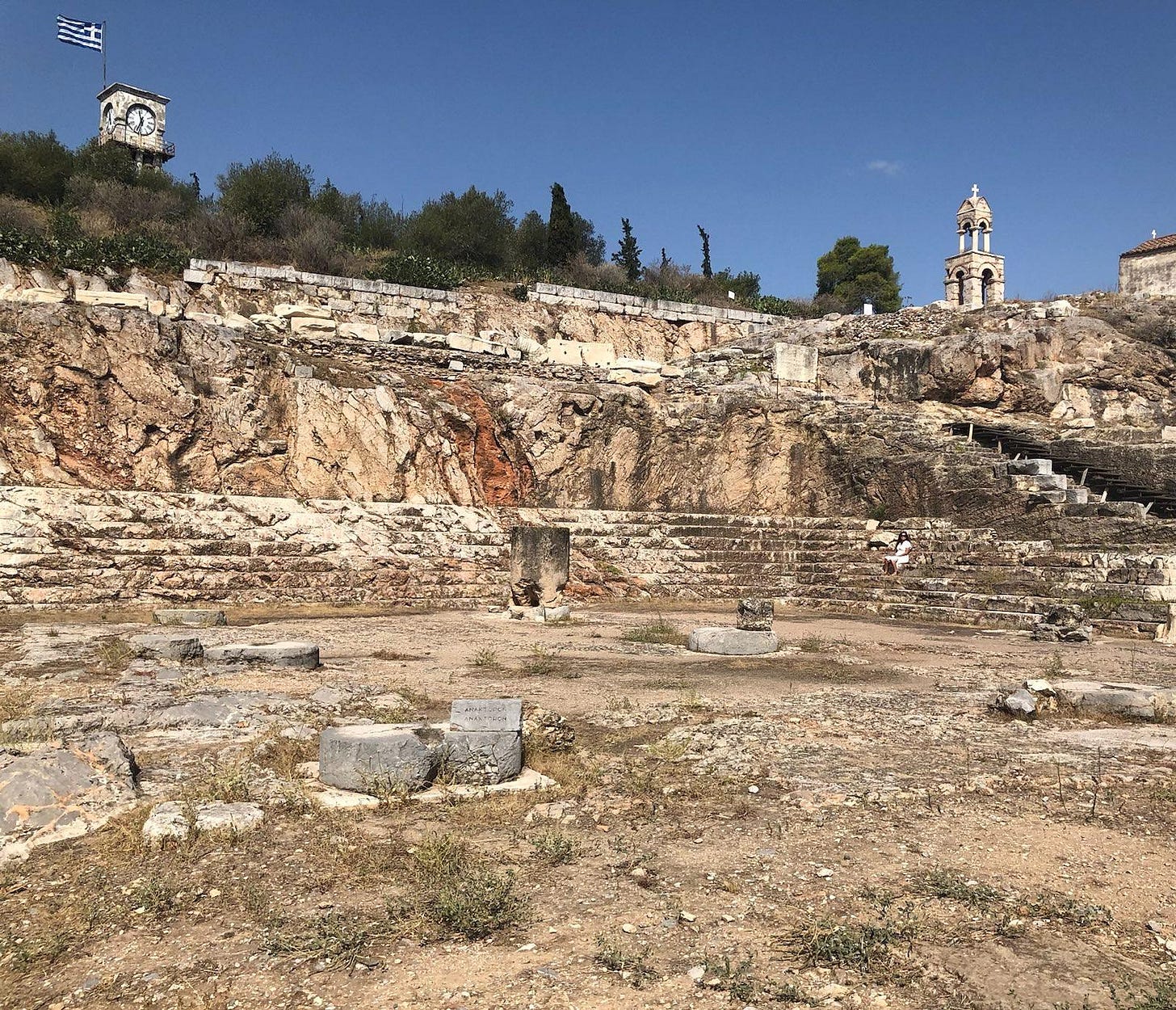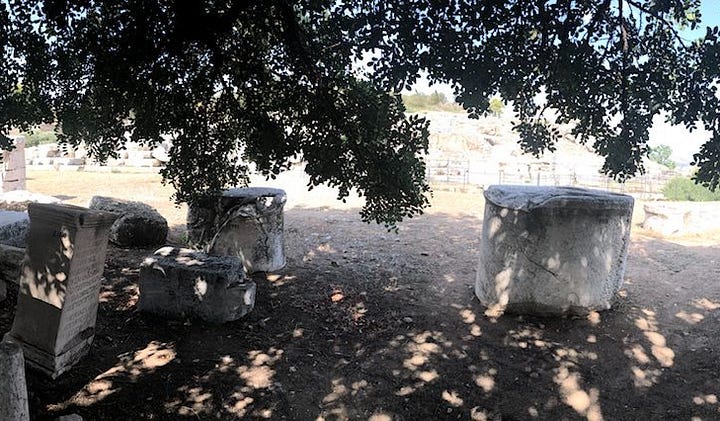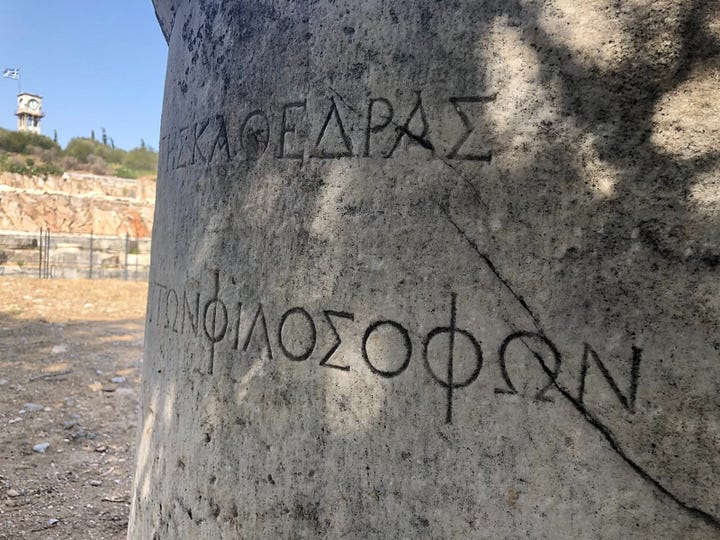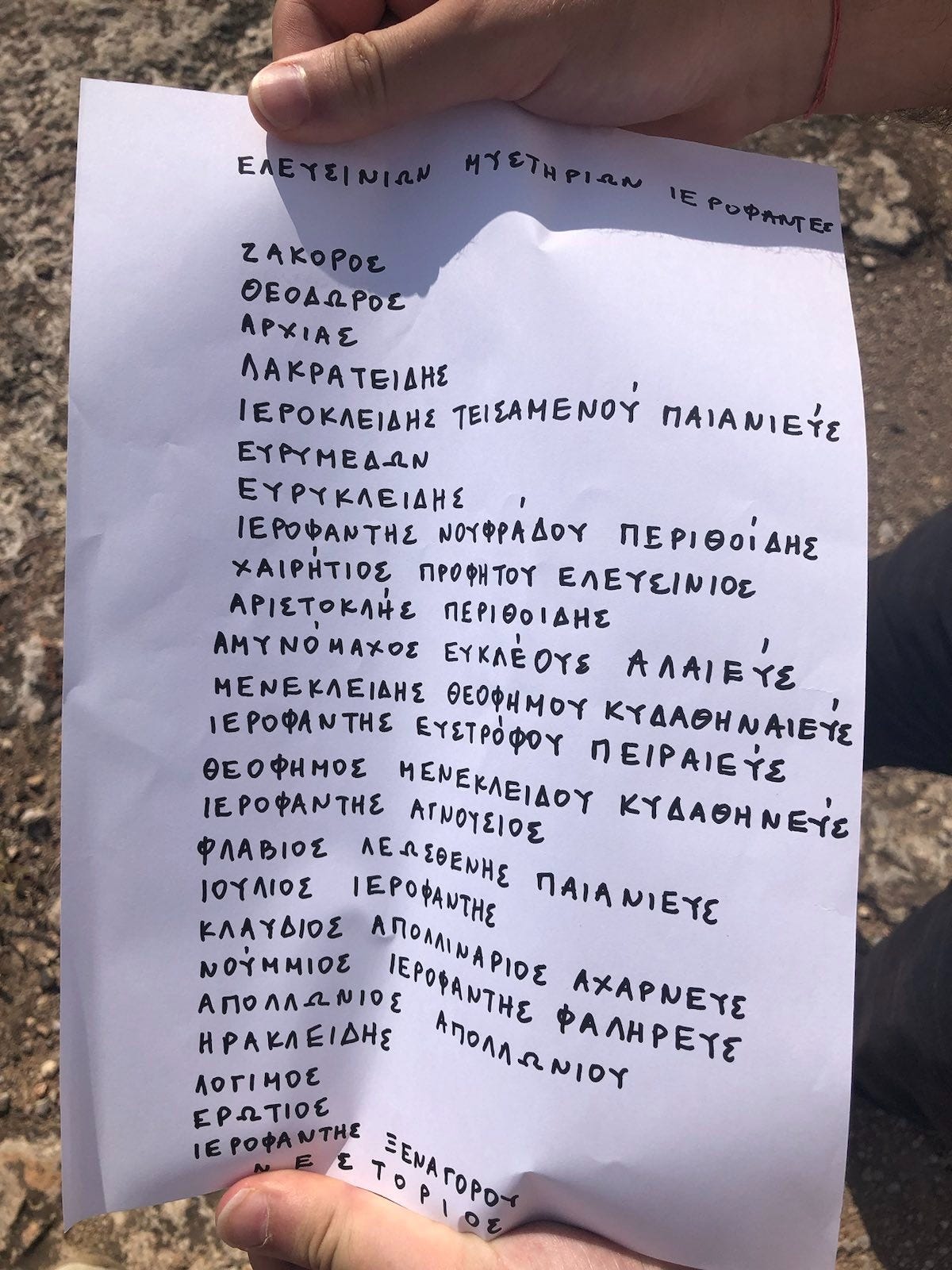Once upon a time in Eleusis
In search of ancient Greek mystics today

“Do you think there could be ancient Greek mystics living today?” I asked my friend Michael Michailidis, who started Ancient Greece Revisited. Maybe he knew where I could begin my search.
“Well, I doubt there could be any unbroken lineage holders, but funny you should ask because I was recently invited to a solstice ceremony at Eleusis. Want to join?”
There couldn't have been a more auspicious place to start my search than a ceremony at Eleusis, the site of the most famous Mysteries in classical antiquity. Of course, I accepted the invitation.
I was instructed to wear white clothing. We were going to drive there from Athens and meet someone there that would introduce us to the rest.
We arrive and notice that a group, mostly dressed in white, were already inside the archaeological site. I remember the entire thing was about to begin when we arrived, so we didn't have a lot of time for socializing. However, I was introduced to one person before the whole thing begun: Κέων Λοκρός Εσπέριος (Keon Lokros Esperios).
He was wearing a t-shirt with some interesting ancient Greek symbols weaved together, but more than the t-shirt what struck me was that there was something about him that I couldn't quite place that intrigued me and I made a mental note I needed to properly meet him at a later point that day.
A middle-aged woman started talking with a stentorian voice, welcoming us, and immediately started sharing information about the true direction from which the initiates were coming to Eleusis. It was assumed everyone knew about the significance of the place and simply wanted to get on with knowing more. It felt like an on-site lecture, but with undertones of reverence that academics usually don't exhibit.
“Don't step over that,” people would remind one another pointing to the foundations of the temple of Artemis and Poseidon located at the entrance, as the group moved towards a location where rather than a lecture, the same woman noted she'd be burning a tiny piece of pork as an offering, near a place where candidates for initiation would do the same in ancient times, symbolically burning away their lower nature. It was mostly symbolic, but people still observed the proceeding with a certain quiet solemnity.
We passed through the propylaea which served as the architectural demarcation point between the sacred and the profane, and made our way to the telesterion, being shown along the way places that could have been possible entrances to the underground chambers where it is believed parts of the original ceremony took place.
We sat at the telesterion where we heard more about the Mysteries along with recitations of certain ancient Greek religious texts. “The Mysteries were imitations of divine events, but we, having had our lineage broken, can only imitate that imitation…” the woman said lamenting the loss of ancient Greek religious continuity given the destruction of ancient Greek temples and the religious persecution the Christians waged over the centuries1. The ceremony ended with a reading out of a probably incomplete list of individuals who used to be hierophants at Eleusis, as a form of tribute.
I approached the woman who had led the ceremony as I wanted a copy of that list to facilitate my own retrocognitions. She was gracious and just gave it to me, and we started a brief conversation.
At some point during our conversation, I couldn't resist but to simply directly ask. Did she remember? Meaning, did she remember any past life of hers in Ancient Greece, partaking in some aspect of ancient Greek religion and mysticism?
My question didn't seem to register, and I didn't push further. I'm not sure whether it was because she was merely a scholar with a fervor for her country's tradition instead of a mystic or whether she simply was reluctant to answer such a personal question from a stranger. Either way, I walked away.
I wandered among the ancient ruins, reflecting on the majesty that once was, overcome with a characteristic melancholy that comes over me when visiting ancient Greek temple ruins, something the Welsh call hiraeth, a word tantalizingly similar in sound to hierophant.

I found a tree that drew me to sit under its shade and decided to meditate there, only later noticing the carvings on the ancient marble nearby wrote of a “seat of the philosophers”2.


It felt just right. I closed my eyes and went within. This was a sacred place.
When I opened my eyes after an indeterminate amount of time, I realized everybody had left, and I remembered they were going to all gather at a nearby café aptly named Kykeon.
I made my way there, met the people who drove me there, and noticed the man I had met at the beginning of the ceremony I wanted to get to know better. I approached Κέων and asked him to join us. I'm not exactly sure why I spared all the small talk, but the moment he sat down, with no prior introduction, I just looked at him straight in the eye and asked him:
“Do you remember?”
“Yes.” he answered without flinching.
He then went on to talk about how he did a ceremony at Mt. Olympus in which through the mystical experience that accompanied it, he remembered he used to be an ancient Greek priest of Dionysus, serving at Delphi. For those who are unaware, Delphi was dedicated half the year to the god Apollo, but the rest of the year, when Apollo left for Hyperborea, was dedicated to Dionysus. He even remembered his ancient Greek name, Κέων, and looked for it in modern databases of ancient Greek inscriptions and indeed found an ancient Greek priest of Dionysus at Delphi with the same name. Being a person trained in the natural sciences, he was dumbfounded. But the memories kept coming, which led him to form a ceremony circle to revive and participate in ancient Greek ceremonies.
I didn't expect I'd find an ancient Greek mystic living today at my first attempt, but here he was, sitting right across me. We shared descriptions of our mystical experiences, which often sounded like two people who have been to similar places they cannot name yet recognize similarities among them in their descriptions.
At the café named after the mysterious drink the ancient Greeks prepared for the mysteries, we discussed the evidence3 suggesting it probably contained some psychedelic properties that facilitated mystical experiences. Michael had already dedicated an entire episode on that hypothesis, nevertheless it was still considered controversial in Greece even among circles like the ones we were just in. We agreed to meet again, to continue our conversations.
Some time ago, after having a better understanding of the occult and reading about nominative determinism and the fascinating empirical studies that lent it support, it dawned on me that our names are like mantras that are repeated throughout our lives on many occasions. It's as if we're casting a spell on ourselves by identifying and being identified by a name and its meaning. So if we're doing that, then what spell would we want to cast?
I liked my first name. Its most common etymological meaning is the defender of men4, so I didn't feel like changing that. However, my last name in Greek literally means something like “someone who sets traps” and if you read it as a family name in Greek it literally reads as “a family that is a trap”. That wasn't a spell I wanted to keep casting. So once upon a time I was reading about the Dionysian Mysteries and came across an adjective of Dionysus called Λύσιος (Lysios), which means he who dissolves and resolves, thereby freeing. It immediately clicked as the opposite of my last name. So I decided to adopt it.
Fast-forward to a café under the Acropolis. Its name: Dionysus. That's the café my new friend, Κέων, chose to have our meeting. We spoke about the mysteries with passion. I told him about the new name I adopted early in the conversation, and then at some later point, as I was talking about what needs to be done for humanity to wake up, Κέων stops me with his eyes sparkling, and his pupils dilated and exclaims: “Lysios!” to point out the congruence between what I was saying and who I had named myself to be.
It was only much later that I found out that the ancient Greeks considered it a sin to have a name that didn't correspond to your essence5, which is why some of them ended up with a different name than the one that was given to them at birth, Plato being a famous example, as his birth name wasn’t Plato but Aristocles. Plato meant “broad”, and it was supposedly given to him because of his broad shoulders by his wrestling coach, but I’m sure it stuck because of his broad mind.
I may have chosen Lysios before that day under the Acropolis6. But it was after that exclamation at the café named after Dionysus that I felt it somehow became official. For I did not come here to entrap people but to set them free.
The story continues with the post From Arrival to Revelation: From Eleusis to Delos
See The Darkening Age: The Christian Destruction of the Classical World, by Catherine Nixey. Since some of the criticism against this book has been that it is too extreme, you can also read the Wikipedia article on the Persecution of pagans in the late Roman Empire, which honestly reads like a giant apologia, a kind of “it wasn’t that bad” for all the crimes and frequently officially sanctioned persecution and destruction by the late Roman Empire that was committed.
ΚΑΘΕΔΡΑΣ is the genitive for ΚΑΘΕΔΡΑ in ancient Greek which means “seat/chair”, whereas ΤΩΝ ΦΙΛΟΣΟΦΩΝ means “of the philosophers”.
See The Immortality Key, by Brian Muraresku for the latest evidence on that hypothesis.
Later etymological analysis showed a potentially more accurate etymology: “the one who unites men to defend them”. By men, I don’t mean male but human.
If I remember correctly, this is somewhere highlighted in the works of Proclus.
I had also chosen another name for myself even earlier than that, which serves as my handle for all my social media accounts: Anametheus/Αναμηθεύς and that too has a special significance.


